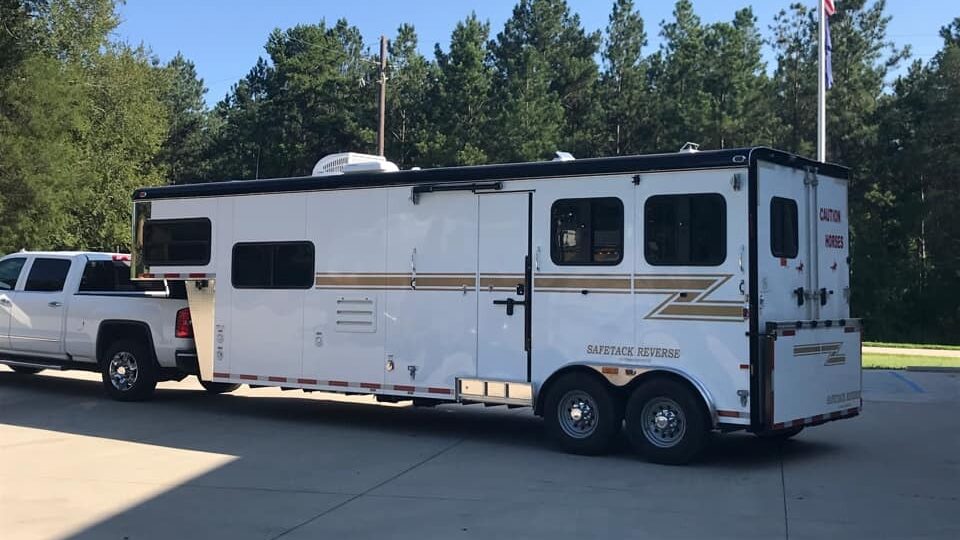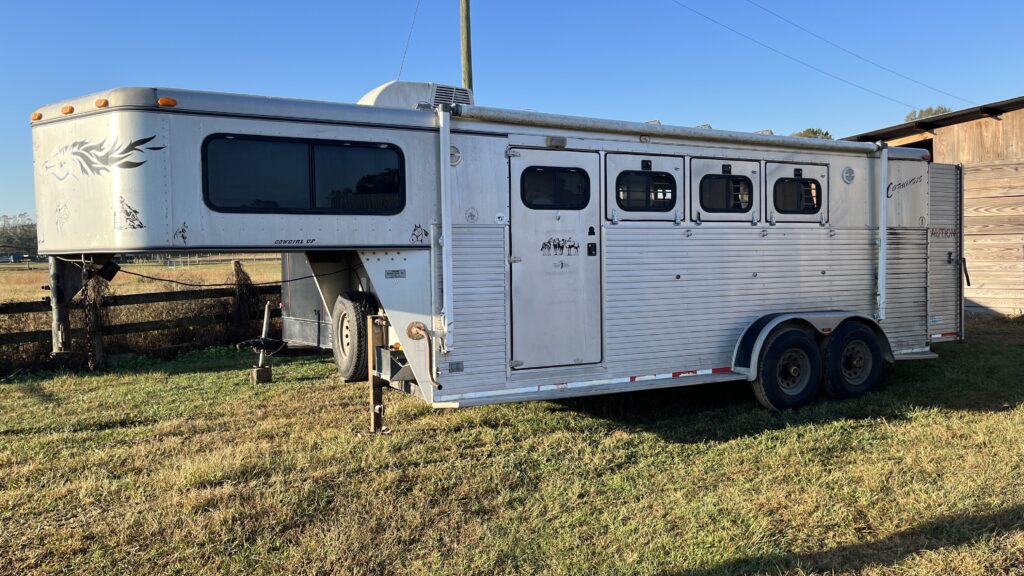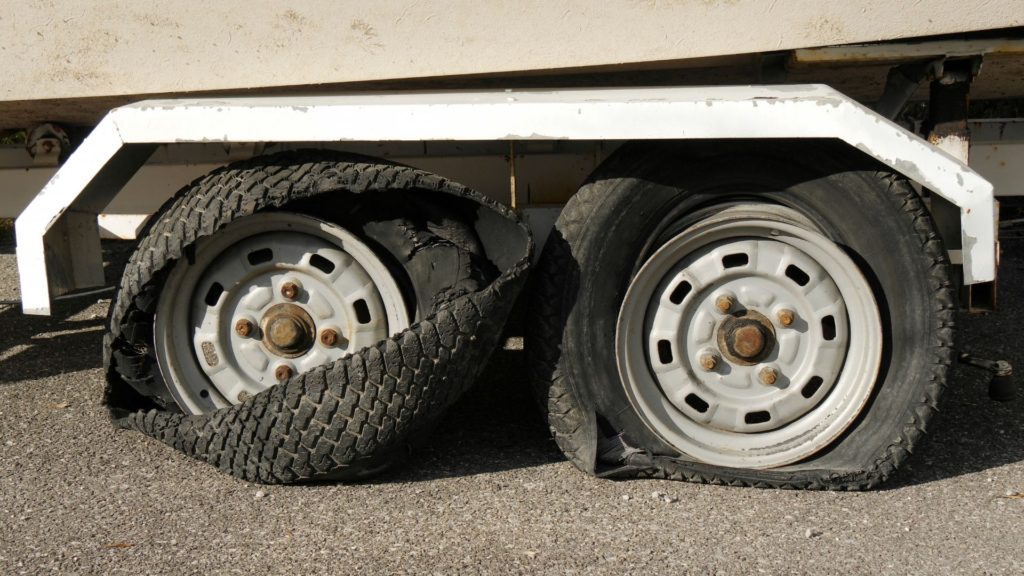Last updated: November 4, 2022
Any links on this page that lead to products on Amazon are affiliate links and I earn a commission if you make a purchase. Thanks in advance – I really appreciate it!
Lucky for us, a friend of ours sells new and used tires, and we need to replace our horse trailer tires. But before we choose our next tires, we need answers to a few questions, what size tires do we need, should we buy new or used tires, and can we use tires made for a car or truck?
Two-horse trailers typically use tire size 205/75-R15, and four-horse, goose-neck trailers, use ST235/80-R16. However, your trailer’s tire size must conform to your trailer’s gross vehicle weight rating (GVWR). The easiest way to choose the correct tire is to match the ones you are replacing.
People often choose tires for their horse trailers based on price. But for your horse’s comfort and safety, your trailer must have the correct size tires. You need to know a lot before buying tires; the cost is just one factor.

How do I know what size trailer tire I need?

The best way to find your trailer tire size is by looking at your trailer’s existing tires’ sidewall. The numbers on the side of the tire identify its size; however, if you change brands or want a different style tire, you can use these numbers as a cross-reference.
You can also choose the correct size tire for your horse trailer by looking at its identification plate, usually on the front or tongue. The plate has the trailer’s VIN and gross vehicle weight rating (GVWR).
The GVWR is the maximum amount a loaded trailer can safely weigh or the trailer’s total weight, including horses, tack, and anything else inside or on top of the trailer.
Once you have the GVWR, you can determine the size of tires you need for the trailer. You determine tire size by dividing your trailer’s maximum weight capacity by the number of tires on your trailer. Each tire has to be rated to handle that amount of load.
For example, a trailer with four tires and a GVWR of 4,000 lbs. needs each tire rated to carry at least 1,000 lbs each. A tire with a load index of 89 has a load capacity of 1,279 pounds and would be ideal for a trailer this size. Click this link to see a chart with the load capacity tire ratings.
What do the numbers on the side of the tire mean?

If you decide to check the current tires on your trailer, it’s helpful to know what the numbers and letters mean. To explain, let’s use the standard tire found on two-horse trailers, the ST205/75-R15.
The first two letters, ST, indicates the tire type, in this case, “special tires for trailer highway service.” In some instances, people use LT tires on trailers, which stands for a light trucks. These aren’t recommended for trailers.
The next number, 205, represents the tire’s width in millimeters, then 75 is the aspect ratio of its height to width, and the R is the construction type; in our example, “R” stands for radial. And finally, the 15 represents the tire’s diameter in inches.
The tire also has a load index and speed rating. A load index is typically a two-digit number following the tire’s diameter number, and the speed rating is represented by a letter. A speed rating of M means it is acceptable to 81 mph.
Does trailer tire size matter?
Fitting a trailer with correct-size tires is critical. If your tires aren’t rated to handle the load, they could come apart, causing an accident resulting in serious injury to your horse, you, and your passengers.
And putting heavy-duty tires that are rated way beyond the weight of the trailer isn’t safe either. The trailer is designed to travel with tires rated for its weight safely. Buying tires rated for heavier trailers doesn’t make the rig safer.
It is essential that you buy the correct size tires for your trailer. You want the proper load index and the type of tire as well; only use “ST” tires.

How often should you replace horse trailer tires?
One of our friends uses his trailer about once a month to haul his horses to local shows, and another regularly transports horses across the country. How do they know when it’s time to replace the tires on their trailers?
Tire manufacturers recommend replacing horse trailer tires at least every five years regardless of their wear. However, you should monitor your tires and replace them when the tread indicator shows, irrespective of how long you’ve had them on your trailer.
Tire makers stamp the week and year they make a tire on its sidewall. It’s a four-digit number close to the rim. For example, if your tire has the number 2120, this indicates the tire was made the twenty-first week of 2020.
In between the treads are small rubber tread indicators. Tire makers call these tread bars. They seem randomly arranged, but I’m sure there is science behind their placement.
Regardless, when your tire’s treads are flush with these rubber indicators, it’s time to replace your tires.
Should I inflate my trailer tires to max psi?
There is a lot of important information on tires’ sidewalls, and one of the most critical is max. p.s.i. But what does this mean? Do I fill it to the max, or does it mean never inflating it to this amount?
It’s recommended you fill your trailer tires to the maximum rated amount before each trip. Tires perform at optimum levels when filled to the max number listed on the tire. This is true even if pressure fluctuates during a trip; the tires should be checked before the trip when tires are cold.
If you run trailer tires at lower pressures than the max rating, it causes heat to build up and diminishes the tire’s performance.

Blow Out Risks
When it comes to purchasing tires, the common thing that hits our minds is blowouts. Low pressure is one of the most common reasons behind sudden or slow tire blowouts. But that’s not the only reason behind these sudden or slow blowouts.
Another reason behind a tire blowout is the tire capacity for excess load. You see, tire load capacity is how much weight the tires can safely bear. If your vehicle contains more weight than your tire can handle, they’re at risk of failing.
So, when it comes to horse trailer tires, make sure you have the proper size tire; they are rated to carry your trailer’s load, have the correct air pressure, and are in good condition to ensure safe travel.
How do I keep my trailer tires from dry rotting?
If you don’t use your trailer often, the tires are prone to dry rot. Dry rot is not only ugly. It costs money to replace tires and is dangerous to ride on. So how can you lessen the effect of dry rot on your tires?
There are a few ways to deter dry rot:
- Use your trailer, tires are designed to be used, and the longer they go without moving, the quicker dry rot sets in.
- Cover your tires to protect them against the elements. The sun is one of the harshest elements on your tires. Some commercial products with UV protection designed to protect tires can help.
- Remove your tires and store them in a shed or storage area.
- Keep the proper air pressure in your tires.
- Jack, your trailer up off the ground if you’re not going to use it for a while.
Are horse trailer tires different than car tires?
Horse trailer tires are marked with an “ST.” These are specifically designed for trailers and are different than tires made for trucks or light vehicles. The primary difference is the material used to make the sidewalls and their tread pattern.
Trailer tire sidewalls are made of thicker material than tires for passenger vehicles. The emphasis on trailer tires is to carry heavy loads and not maintain control in turns like car and truck tires.
What are the best tires for a horse trailer?
The best tires for horse trailers must meet the trailer’s specifications for load, and it also depends on how you drive. When it comes to horse trailer tires, the quality of many of the major brands is acceptable.
Some niche brands, such as Towmax tires and Carlise, manufacture special tires for horse trailers. Each of these tires maintains high-quality standards. The cited tires are made of premium materials for enhanced quality and service.
These horse trailer tires have high-quality designs that ensure a stable ride on the bumpiest roads. In addition to that, they are specially designed for extended mileage.
But much like anything else, we often have a brand we prefer more than others, so it’s subjective, but the tires must be the right size to meet your trailer’s needs.
Related articles:
- 5 Horse Trailer Essentials You Need When Hauling Horses
- 10 Best Bumper-Pull Horse Trailers on the Market Right Now
- How Tall is a Horse Trailer? Heights of Popular Models
- Best Weight Distributing Hitches for Horse Trailers
- Slant Load or Straight Load Two-Horse Bumper-Pull Trailer?
- towing-a-two-horse-bumper-pull-trailer-all-you-need-to-know/

About the Author: Miles Henry
Lifelong Horseman | Racehorse Owner | Published Author
Miles Henry brings over 25 years of hands-on experience training and owning Thoroughbred racehorses. Raised with Quarter Horses and Appaloosas, he’s spent a lifetime learning from horses—on the track, in the barn, and in the field. Today, he runs a small but successful racing stable in Louisiana and shares real-world insights on HorseRacingSense.com, helping horse owners, fans, and bettors navigate the sport with confidence.
📚 Books: View Miles’s books on Amazon »
🎧 Podcast Guest: Animal Tales Ep. 32 |
YouTube Interview
📩 Newsletter: Sign up for racing tips and horse care advice »
🔗 Follow Miles:
Twitter |
Facebook |
YouTube

